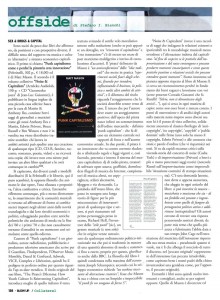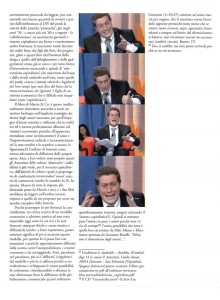Kritika berria: NEURAL Magazine
Thursday, April 29th, 2010Neural Magazine (Italia) media art-hacktivism-e music 1993tik
This book is an exception to the rule that a product can be judged from its price. It is free (either downloading it or trading a printed copy) and it sports professional editing, graphic design and production. But it seems just a direct consequence of the challenge to properly face such a topic. Noise in music has been usually treated for its specific and problematic way of approaching composition (except for the seminal book “noise” by Jaques Attali from which this text seem to stem and flourish), and its ability to reflect the very edge of our time. This work looks at the political role of noise in the market, reconstructing the genre through a series of essays describing different music dynamics, while representing a clear act of resistance. This kind of resistance involves not only “assuming risks” about musical stereotypes and the markets surrounding them, but also affects the act of performing, production and distribution. Produced by the Basque Arteleku institution and its active Audiolab, the book can ideally be accompanied by the CD, “Gezurrezko joera” by Jean-Luc Guionnet, a perfect complement to the theory, with another peculiarly split and non-harmonic classic organ performance by the artist. Finally, it would be useful to point out that the only way to get this book is a distribution by trading. Creative people can request a copy by sending a sample of their work (that will be hosted in the Arteleku library) or by writing a critical response to the book (after downloading the free pdf file).
http://www.neural.it/art/2010/04/edited_by_mattin_anthony_iles.phtml
http://www.neural.it/art_it/2010/04/edited_by_mattin_anthony_iles.phtml



 Standing by what you write is the springboard Ben Watson uses to dive into a typically vigorous exposé of his ideas in Noise as Permanent Revolution or, Why Culture is a Sow Which Devours its Own Farrow. Taking issue with The Wire‘s Sam Davies for trashing an Ascension gig in Bristol in 1994 only to remember it fondly 13 years later (being able to change your mind and admit that you’re wrong is obviously anathema to Ben’s militant aesthetix), he comes up with some splendidly quotable lines (how about “the courage of youth enables it to look directly in the face of things.. [i]ts folly is to imagine that no-one else has ever done so” and “people who talk about the problems of modern music without talking about capitalism and commodity fetishism are themselves one of modern music’s problems”?), though one wishes he’d spent more time explaining the subtleties of Giambattista Vico (see photo)’s Scienza Nuova – a work I’m not at all familiar with but for which this article has most definitely whet my appetite – than taking potshots, albeit amusing and well-aimed, at his former employers at Wire HQ. Watson writes well – he’s one of the few contributors to this book whose voice you can really hear from reading his prose – but quite why Jaworzyn’s Ascension is “THE answer to dilemmas facing anyone discontent with the musical ready-meals dished up by commercial interests” isn’t explained, and what Tony Oxley, Fernando Grillo, Iancu Dumitrescu and Ana-Maria Avram are doing in a thesis ostensibly about Noise is anybody’s guess.
Standing by what you write is the springboard Ben Watson uses to dive into a typically vigorous exposé of his ideas in Noise as Permanent Revolution or, Why Culture is a Sow Which Devours its Own Farrow. Taking issue with The Wire‘s Sam Davies for trashing an Ascension gig in Bristol in 1994 only to remember it fondly 13 years later (being able to change your mind and admit that you’re wrong is obviously anathema to Ben’s militant aesthetix), he comes up with some splendidly quotable lines (how about “the courage of youth enables it to look directly in the face of things.. [i]ts folly is to imagine that no-one else has ever done so” and “people who talk about the problems of modern music without talking about capitalism and commodity fetishism are themselves one of modern music’s problems”?), though one wishes he’d spent more time explaining the subtleties of Giambattista Vico (see photo)’s Scienza Nuova – a work I’m not at all familiar with but for which this article has most definitely whet my appetite – than taking potshots, albeit amusing and well-aimed, at his former employers at Wire HQ. Watson writes well – he’s one of the few contributors to this book whose voice you can really hear from reading his prose – but quite why Jaworzyn’s Ascension is “THE answer to dilemmas facing anyone discontent with the musical ready-meals dished up by commercial interests” isn’t explained, and what Tony Oxley, Fernando Grillo, Iancu Dumitrescu and Ana-Maria Avram are doing in a thesis ostensibly about Noise is anybody’s guess.